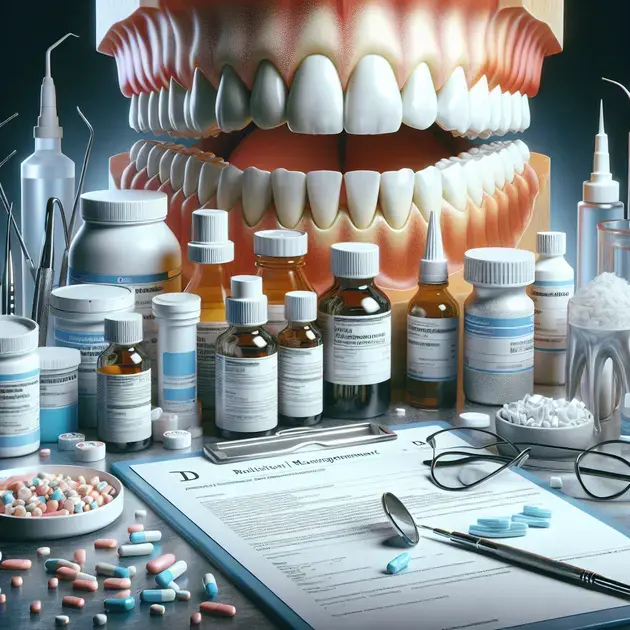Are you struggling with periodontitis and looking for effective medication to treat it? Look no further, as this comprehensive guide will provide you with all the information you need to tackle this oral health condition head-on. Periodontitis is a common but serious gum infection that can lead to major health issues if left untreated.
With the advancements in dental medicine, there are now various effective medications available to help manage and treat periodontitis. From antibiotics to antimicrobial mouthwashes, this guide will cover the different options, their benefits, and how they can be used to combat this condition effectively.

Understanding Periodontitis Treatment Options
Periodontitis is a serious gum infection that damages the soft tissue and destroys the bone that supports your teeth. It can lead to tooth loss if left untreated. Understanding the treatment options available is crucial for managing this condition effectively. Here, we will explore different ways to treat periodontitis and improve your oral health.
Educate Yourself on Periodontitis
The first step in understanding periodontitis treatment options is to educate yourself about the condition. Visit reputable websites such as the American Academy of Periodontology or the Mayo Clinic for accurate information about periodontitis, its causes, symptoms, and treatment options.
Consult with a Periodontist
Scheduling a consultation with a periodontist is essential for receiving personalized treatment recommendations. Use online platforms like Zocdoc or Healthgrades to find a highly rated periodontist in your area. During your appointment, discuss your symptoms and medical history to create a customized treatment plan.
Consider Non-Surgical Treatments
Non-surgical treatments for periodontitis include scaling and root planing, antibiotic therapy, and laser therapy. Research clinics or dental offices in your area that offer these services. Websites like Dentistry.com or Healthline can provide insights into the effectiveness of these treatments.
Explore Surgical Options
In severe cases of periodontitis, surgical intervention may be necessary. Procedures such as flap surgery, bone grafting, and guided tissue regeneration can help restore gum health and prevent further damage to the teeth and bone. Check out the American Dental Association’s website for information on accredited oral surgeons who specialize in periodontal procedures.
Maintain Good Oral Hygiene
Regardless of the treatment option you choose, maintaining good oral hygiene is paramount for managing periodontitis. Use dental apps like Oral-B or Colgate Connect to track your brushing and flossing habits. These apps can remind you to complete your oral care routine and provide tips for improving gum health.
Exploring Different Medication for Periodontitis
Medication can play a significant role in treating periodontitis by reducing inflammation, fighting bacteria, and promoting gum healing. Exploring the various types of medication available can help you find the most effective treatment for your condition.
Antibiotics for Periodontitis
Antibiotics such as doxycycline, minocycline, and metronidazole are commonly prescribed to treat periodontitis. These medications can be taken orally or applied directly to the gums. Visit the National Library of Medicine’s MedlinePlus website for detailed information on these antibiotics, including their side effects and interactions.
Anti-Inflammatory Drugs
Nonsteroidal anti-inflammatory drugs (NSAIDs) like ibuprofen can help reduce pain and inflammation associated with periodontitis. Consider consulting with a pharmacist at CVS or Walgreens to learn about over-the-counter NSAIDs that can supplement your periodontal treatment plan.
Prescription Mouthwashes
Prescription mouthwashes containing chlorhexidine or essential oils can help control plaque and bacteria in the mouth. Ask your dentist or periodontist about where to purchase these specialized mouthwashes. Websites like WebMD or Everyday Health offer reviews and recommendations for effective dental products.
Topical Gels and Ointments
Topical gels and ointments containing antimicrobial agents can be applied directly to the gums to target bacteria and promote healing. Look for these products at local pharmacies like Rite Aid or online retailers such as Amazon. Read customer reviews and consult with your healthcare provider before using any topical medications.
Vitamin Supplements
Some studies suggest that vitamin supplements, particularly vitamin C and D, can support gum health and reduce the risk of periodontitis progression. Explore websites like Vitacost or iHerb for a variety of vitamin supplements specifically designed for oral health. Remember to consult with your healthcare provider before adding any new supplements to your regimen.
Maximizing the Benefits of Effective Medication
Once you have chosen the appropriate medication for treating periodontitis, it is essential to maximize its benefits for optimal results. Follow these steps to ensure that your medication works effectively in combating gum disease.
Adhere to Your Treatment Plan
Consistency is key when taking medication for periodontitis. Follow your prescribed dosage and schedule meticulously to maintain the therapeutic levels of the medication in your system. Set reminders on your smartphone using apps like Mango Health or Medisafe to stay on track with your treatment plan.
Maintain Regular Dental Visits
Keep up with your scheduled dental appointments to monitor the progress of your periodontal treatment. Dentists can evaluate the effectiveness of the medication and make adjustments as needed. Use platforms like Opencare or Zocdoc to find and book appointments with trusted dental providers in your area.
Monitor Side Effects
Pay attention to any side effects or adverse reactions to the medication you are taking. Report any concerns to your healthcare provider promptly. Utilize healthcare websites such as Drugs.com or RxList to research potential side effects of your prescribed medication and understand when to seek medical attention.
Make Lifestyle Changes
Incorporate healthy habits into your daily routine to support the effects of your medication. This includes quitting smoking, eating a balanced diet rich in vitamins and minerals, and managing stress levels. Apps like QuitNow or MyFitnessPal can help you track your progress and stay motivated to make positive lifestyle changes.
Stay Informed and Educated
Continue learning about periodontitis and the latest advancements in treatment options and medications. Follow reputable dental journals like the Journal of Periodontology or the International Journal of Dentistry for updated research and insights. Stay informed to make informed decisions about your oral health.

Understanding Different Medications for Gum Disease
When it comes to treating gum disease, there are various medications available that can help combat the infection and improve the health of your gums. These medications work in different ways to target the underlying causes of gum disease and reduce inflammation.
One common type of medication used for gum disease is antimicrobial mouth rinses. These rinses contain ingredients that help kill bacteria in the mouth, reducing the amount of plaque and tartar that can contribute to gum disease. Another type of medication is antibiotic gels or microspheres, which are applied directly to the gum pockets to target and eliminate bacteria.
In more severe cases of gum disease, systemic antibiotics may be prescribed to help control the infection. These medications are taken orally and work throughout the body to fight the bacteria causing the gum disease. It is important to follow your dentist’s instructions carefully when taking systemic antibiotics to ensure they are effective.
Overall, understanding the different medications available for gum disease can help you and your dentist create a treatment plan that is tailored to your specific needs. By incorporating these medications into your oral care routine, you can improve the health of your gums and prevent the progression of gum disease.
Effective Medication Management for Periodontitis
Managing periodontitis effectively often requires a combination of medications to target the infection and reduce inflammation in the gums. These medications play a crucial role in controlling the progression of the disease and preventing further damage to the gums and surrounding structures.
One key aspect of medication management for periodontitis is the use of antimicrobial agents such as chlorhexidine mouth rinses. These rinses help reduce the amount of bacteria in the mouth, which can in turn lower inflammation and promote healing of the gums. Additionally, antibiotics may be prescribed to target specific strains of bacteria that are contributing to the infection.
In some cases, anti-inflammatory medications like corticosteroids may be used to help reduce swelling and pain associated with periodontitis. These medications can be applied directly to the affected areas or taken orally, depending on the severity of the condition. It is important to work closely with your dentist to determine the most effective medication management plan for your periodontitis.
By effectively managing your medications for periodontitis, you can improve the overall health of your gums and reduce the risk of complications associated with this advanced form of gum disease.
Optimizing Periodontitis Treatment with Medications
When it comes to optimizing treatment for periodontitis, medications play a key role in controlling the infection and promoting healing of the gums. By using the right medications in conjunction with professional dental care, you can effectively manage the symptoms of periodontitis and prevent further deterioration of gum health.
One of the primary goals of medication therapy for periodontitis is to target the bacteria causing the infection. Antibiotics may be prescribed to eliminate specific strains of bacteria that are contributing to the disease process. These medications can be taken orally or applied directly to the affected areas for targeted treatment.
In addition to antibiotics, anti-inflammatory medications may be used to reduce swelling and discomfort associated with periodontitis. These medications help lower inflammation in the gums and promote tissue healing. Your dentist may recommend a combination of medications to address both the infection and the symptoms of periodontitis.
By working with your dentist to optimize your periodontitis treatment with medications, you can achieve better outcomes and improve the overall health of your gums. It is important to follow your dentist’s recommendations closely and maintain good oral hygiene practices to support the effectiveness of the medications.
Conclusion
Understanding the different medications available for gum disease is crucial in developing a tailored treatment plan that addresses the specific needs of individuals. From antimicrobial mouth rinses to antibiotic gels, these medications target bacteria, reduce plaque, and combat inflammation to improve gum health effectively. By following the dentist’s instructions, especially with systemic antibiotics in severe cases, the effectiveness of the medications can be maximized.
Effective medication management for periodontitis involves a combination of medications like chlorhexidine mouth rinses and antibiotics to combat the infection and inflammation, preventing further damage to the gums. Incorporating anti-inflammatory medications such as corticosteroids can help alleviate swelling and pain associated with periodontitis, contributing to overall gum health improvement. Working closely with the dentist for a personalized medication management plan is essential.
Optimizing periodontitis treatment with medications plays a vital role in controlling the infection, promoting tissue healing, and managing the symptoms effectively. Antibiotics and anti-inflammatory medications work synergistically to target bacteria, reduce inflammation, and support tissue healing. By adhering to the dentist’s recommendations and maintaining good oral hygiene practices, individuals can achieve better outcomes and enhance the overall health of their gums through optimized medication treatment.



